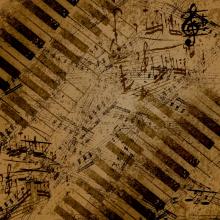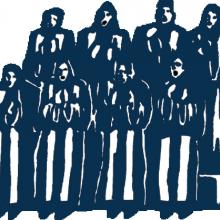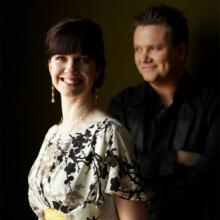hymns
RICH MULLINS HAD a museum of a personality. The singer-songwriter, who died in a car accident in 1997, loved to show off anything he found interesting, his friends say. From music to movies to the places he traveled, Mullins loved “for you to experience what he loved,” his friend and collaborator Mitch McVicker told Sojourners.And more than just about anything else, Mullins loved Jesus.
Mullins’ career tracked alongside the evolution of contemporary Christian music (CCM), which went from marginal in the 1970s to a powerhouse genre that sold a combined 31 million albums in 1996. Best known for the modern hymn “Awesome God,” Mullins wrote his fair share of songs that fit Christian radio. But more often, his music was a kaleidoscope of faith and humanity, offering a tour of human frustration and failure.
On “Hard to Get,” Mullins, as modern psalmist, asks God, “Do you remember when you lived down here, where we all scrape to find the faith to ask for daily bread? / Did you forget about us, after you had flown away?”
In other places, Mullins plays minor prophet. “I wrote this for the Religious Right,” he declared before singing that Jesus “came without an axe to grind [and] did not toe the party line,” during a performance of “You Did Not Have a Home.”
ON HIS DEBUT record, Palisade, released in 2012, Americana wunderkind Parker Millsap ends the title track singing with blues-soaked vocals, “Writing on a blank white page keeps my demons one more day away.” For Millsap, an Oklahoma native who now calls Nashville home, those lyrics weren’t just a young artist trying to sound profound; they spoke truth to his experience with music and faith.
“When I’m playing [music] with other people and for other people, there is something about it that will always feel spiritual to me,” says Millsap. “After all, that spiritual feeling, that’s the context I first received music in.”
Millsap grew up in a Pentecostal church in a small Oklahoma town, and says if people were going to speak in tongues or run around the sanctuary, it was almost always during the music. “I always resonated with using music to reach ecstatic states,” he says. “As soon as I could play enough chords to keep up, they put me down in front at church.”
On November 12, news broke that Christian songwriter Kurt Kaiser had died at 82. His work, which included memorable songs such as “Pass It On” and “Oh How He Loves You And Me,” spanned nearly 50 years. Kaiser’s name appeared on more than 25 albums and he received a lifetime achievement award from the American Society of Composers, Authors, and Publishers for his contribution to Christian music. One of his songs remains one of the most important in my life, some 30 years after first hearing it.
This new hymn is in response to the latest news of abuse by clergy; it was written with input from survivors and counselors. The hymn also references Pope Francis’ Aug. 20 letter, using in particular: “If one member suffers, all suffer together with it” (1 Corinthians 12:26). Please share the hymn with priests, pastors, church musicians, counselors, friends and others who might find it helpful. Permission is given for its free use. Prayers, including sung ones, and actions are needed to “Bring healing, love and mercy; Bring justice, God of truth.”

Image via Sergey Nivens/Shutterstock
What I am learning is that the new normal is not that I no longer experience God, but that God is meeting me in new ways. The new normal is that I don’t need to hear people play guitar telling me to feel God’s love from a stage. I find God’s love in much less conspicuous places, from the stranger behind me who felt too awkward to shake my hand, to the silly doodles my kids were making on the church bulletin. The new normal is that I no longer find authority in celebrity pastors preaching at me, but I do find it listening to unheard voices of small bloggers and older people who aren’t social media savvy.
The new normal is that I hear the "Roman Road" gospel preached and find it dull and superficial, and yet feel overwhelming conviction in the cross lived out by people who forgive their enemies.
The new normal is that although God has not changed, I have changed. And like a parent who stops cooing in baby talk, God is starting to speak in new, fresh ways to me.
“Is It Lawful to Pay Taxes?”
“Is it lawful to pay taxes when they prop up Caesar’s rule?”
So some people asked of Jesus, wanting him to seem a fool.
Saying “no” would be sedition; saying “yes” would be a sin.
Jesus changed the conversation, calling them to look within.
“Find a tax coin in your treasure; see the image that it bears.
Give to Caesar what is Caesar’s. (Give to rulers what is theirs.)”
Yet he pressed on with his message; “Give to God what is God’s own.”
We who bear our Maker’s image worship God and God alone.
The deep, dark secret of the church is that the beliefs and convictions of Christians are often shaped far more by the hymns we sing than the theological tomes gathering dust on our bookshelves. Songs are avenues for praising God, but they are also tools for imparting knowledge. Singing is a theological exercise, so the words printed in hymnbooks or flashed on screens deserve attention and reflection.
“How Great Thou Art” has been sung in churches, automobiles, and probably the occasional shower since the late 19th century. Long used in traditional worship services, many contemporary artists are offering their own renditions of this classic and adapting it for more contemporary settings. Even Carrie Underwood (no relation) is getting into the act.
This is an ode to God’s majesty and power. It testifies to the beauty created by God’s hand and witnesses to the connection between the love behind God’s creative acts and the love poured out by Christ on the cross.
The famous opening line, “O Lord my God, When I in awesome wonder, Consider all the worlds Thy Hands have made” sets the stage. They also easily get stuck in your head playing on endless loop.
Creation – stars, thunder, forest, birds, majestic mountains, gentle breezes, and everything else – indicates the greatness of God. It provokes wonder among us humans, forcing us to acknowledge the subordinate relationship between creature and Creator. We cannot do what God has done; our accomplishments will always pale in comparison.
I invite you to stop reading this now, listen to a copy of the hymn “For the Beauty of the Earth,” and go sing it in celebration while walking around your neighborhood.
If you’re still with me, I’ll explain why:
Since learning the hymn several years ago, it has come to mind in many memorable places that now fill my mental landscape whenever I sing the hymn. One of those places is a park overlooking the Anacostia River near my house in Washington, D.C. Kenilworth Park was built on the site of a city dump that was plowed over 40 years ago and is now undergoing a remediation process to control suspected groundwater contamination. But despite its tainted legacy, it’s still one of the most beautiful places in Washington D.C.
The park constantly reminds me of the distance between what is and what could be. It’s full of potential, but sometimes the park’s potential is the only positive thing I see. On a recent walk through it, I came to my favorite overlook across from the National Arboretum and was momentarily struck by the contrast. The overlook is always full of trash from the river and at times overgrown with invasive plants, but this time, as I walked up, I caught a glimpse of a Northern Harrier flying along the river. I had never seen a Northern Harrier, much less so close to my house and in such an unlikely place. It momentarily caught me and my bird-watching friends breathless; we were reminded of the potential always hidden within the park.
Praise God, from whom all blessings flow;
Praise [God], all creatures here below;
Praise [God] above, ye heavenly host;
Praise Father, Son, and Holy Ghost, Amen.
Words by Thomas Ken (1674)
The Doxology was my favorite hymn growing up. We would sing it every Sunday in church at the end of the service, mostly a cappella. I was amazed at the different harmonies and range in which the hymn could be sung. I loved how simple the words were. But I did not understand the words fully until well into my adult life. As a kid, I immediately disregarded things like animals, plants, insects, and fish as creatures that could praise God. Surely the act of praising God is only reserved for the sentient beings, with a conscience and the ability to say in words “praise God.” No way would God receive the praises of a mosquito, or fern or cat or pig.
It took the glory of creation itself for me to fully understand the words of the Doxology. A year out of college, I was sitting on a kayak in the middle of Doubtful Sound, New Zealand surrounded by snowcapped peaks that dropped right into the water. The sun was shining, dolphins were swimming nearby, and the birds were chirping. Then the song hit me “Praise God, all creatures here below.” I could hear the songs of praise from his non-human creatures. It finally dawned on me that my songs of praise paled in comparison to the winds that touch the peaks of mountains, the perfect songs of birds and the language of dolphins. They are all songs of praise!
Many years ago, I sat in a church that resembled nothing like the church that I barely frequented while growing up. As the overhead lights dimmed in preparation for opening song, a blue-ish red hue washed over the stage to what felt like a concert opening and the following lyrics for “Indescribable” emerged on two oversized screens flanking the worship team:
From the highest of heights to the depths of the sea
Creation’s revealing Your majesty
From the colors of fall to the fragrance of spring
Every creature unique in the song that it sings
All exclaiming …
These song lyrics stuck with me because they remind me of how God is manifest in our natural world, where grace and interconnectedness are reflected in species that are intricately dependent on one another, and where the sheer beauty of our earth often becomes more apparent when we are able to step away from our industrialized lives and behold a starry night or a hike in the woods.
These lyrics also remind me of the part in Genesis where Adam is first put in charge of taking care of Eden and then gets to name all the animals, implying that he is responsible for them too:
“The Lord God took the man and put him in the Garden of Eden to work it and take care of it … Now the Lord God had formed out of the ground all the wild animals and all the birds in the sky. He brought them to the man to see what he would name them; and whatever the man called each living creature, that was its name. So the man gave names to all the livestock, the birds in the sky and all the wild animals …” (Gen 2:15; 19-20).
In these days barren fields will sprout trees
The deaf and blind will hear and see
The dead will raise and begin to breathe
The earth will groan in pain to see
The sons of God declare to be
His full and glorious family
The beautiful, perfect bride of Thee (Wash Me Clean, Page CXVI)
I am a city girl through and through — I’ve never lived outside of an urban context. Although my family lived in Queens (represent!), our church and community were in the dense and often treeless “ghetto” of Alphabet City, a neighborhood on the Lower East Side of Manhattan. My experiences of nature have mostly consisted of front and back yards, parks, and occasional trips to the beach or camping. And because I grew up in and spent most of my life in communities of the poor and marginalized, most of my experiences of God have centered around what Divine mercy, justice, healing, liberation, and restoration look like in the human heart.
In other words, it’s very easy for me to grasp the idea of a “New Jerusalem” or “a city whose architect and builder is God.” It’s easy for me to see the human component of God’s kingdom and what it means for people. It’s not so easy for me to imagine trees “clapping their hands” or even fully to appreciate the majesty of God’s handiwork in the stars ... because I’ve rarely seen a night sky free from light pollution. It’s not easy for me to imagine what a renewed creation would look like apart from new hearts and restored people.
Jesus' teaching to his followers in John 14:6 is a challenging one in our world filled with people of diverse faiths: "Jesus said to him, "I am the way, and the truth, and the life. No one comes to the Father except through me." See " What Do Our Beliefs Say About Us?" by Rev. Dr. Guy Nave. The following new hymn lifts up Jesus' teaching in the context of his inclusive ministry seeking God's love and justice for all. John 14:1-14 is the Revised Common Lectionary gospel lesson that will be read in many churches this coming Sunday, May 18th.
Christ, You Are the Savior
ASH GROVE (“Let All Things Now Living”)
MOST MEDIA ACCOUNTS of Nadia Bolz-Weber focus on her tattoos. She has the liturgical year tattooed on one arm, from creation to Pentecost; another features Lazarus still wrapped, but very much alive. She got that one while struggling to write a sermon on Jesus’ raised friend.
The tattoos on a 6’1” woman with a taste for punk, a bad-girl past, and a gay-inclusive church—House for All Sinners and Saints in Denver—make for easy picking for secular media. You may have caught Bolz-Weber’s book Pastrix on the New York Times bestseller list. Wise, self-aware, hipster Christian celebrities have a market for books, and she’s tapped it.
In contrast to much of the superficial media coverage, what’s most interesting about Bolz-Weber is her deep traditionalism. “Secular media doesn’t understand the difference between orthodox and conservative,” she tells me through a toothy smile, blue-green eyes blazing over thick-rimmed ’50s-era glasses.
“House,” as the community calls itself, is almost medieval in its liturgy. There are no instruments, just a cappella chant and pillows for kneelers at a prayer station. The Eucharist is served weekly. Eastern Orthodox iconography drapes the church’s interior, stoles, website, and literature. Latin hymns fill the communion liturgy on the Sunday evening I attend. Bolz-Weber is proud to be using Franz Schubert’s setting for the Mass.
This is not high church fussiness; it is liturgical and churchly orthodoxy for scruffy hipsters. Bolz-Weber explains that many of her fellow social progressives want to jettison the Bible and Jesus in order to be more inclusive. “But why should we jettison the only things we have going for us?” she asks.
Troy Bronsink’s meditative live album Songs to Pray By stretches its sonic arms to embrace every listener with expansive words of spirited awe and awesome humility, with ecstatic waves of audio grace and rhythmic gravity.
Bronsink and his band bring to church what we’ve seen out on the festival circuit for years: a shimmery and psychedelic use of sound and language to elevate listeners who choose to inhabit a song as if it were wings, the place where the spirit soars and the heart sings. We don’t often associate noodly guitars and trippy percussion with the worship sound, which is exactly why this album is such a perfect addition to the praise genre.
A solo Bronsink will be presenting his musical work tomorrow at the Wild Goose Festival. We both took a break from packing and planning our journeys to North Carolina for this email interview.
Fans of a beloved contemporary Christian hymn won’t get any satisfaction in a new church hymnal.
The committee putting together a new hymnal for the Presbyterian Church (USA) dropped the popular hymn “In Christ Alone” because the song’s authors refused to change a phrase about the wrath of God.
The original lyrics say that “on that cross, as Jesus died, the wrath of God was satisfied.” The Presbyterian Committee on Congregational Song wanted to substitute the words, “the love of God was magnified.”
The song’s authors, Stuart Townend and Nashville resident Keith Getty, objected. So the committee voted to drop the song.
Carolyn Winfrey Gillette, a pastor who is a foster mother to a four year-old African American boy, wrote this hymn after George Zimmerman was found not guilty for his shooting of Trayvon Martin. She had read Jim Wallis’ “Lament from a White Father” and heard the Rev. Otis Moss of Chicago's Trinity United Church of Christ interviewed for the NPR report, “For The Boys Who See Themselves In Trayvon Martin.”
We Pray for Youth We Dearly Love
O WALY WALY LM (“Though I May Speak”)
Solo (optional young voice):
“If I should die before I wake,
I pray thee, Lord, my soul to take....
And if I die on violent streets,
I pray thee, Lord, my soul to keep."
(Continued at the jump)
My wife and I are attending our denomination's national assembly in Orlando this week. Last night, we went to a retirement party for one of her mentors. As a group of ministers tends to do, they concluded by gathering around, laying their hands on, and offering him a prayer of blessing. Then the group spontaneously broke out into a round of song that went on for a few minutes. It was both beautiful and touching.
The wait staff, however, wasn’t quite sure how to take it.
"Wow," one bartender said," that's amazing. You guys can all really sing."
Amy just smiled.
“That's church," she said.
A few months ago, Stephen Marsh, my fellow pastor, and I walked into Chief’s Tavern on the east side of Madison, Wis., ordered a couple pints, sat on a pair of stools and discussed an idea that would eventually have a massive impact on the congregation we serve together. In specifics, we wondered whether we could spark a ministry by fusing two of our most treasured Lutheran traditions: beers and hymns.
The budding idea, which originated from some creative faith communities in other parts of the country, was to find a local tavern willing to host a monthly one-hour session of hymn-inspired evening fellowship. Within a few minutes of our conversation, we were joined by Brian Mason (owner of Chief’s Tavern), and what followed was a ground-breaking partnership between parish and pub. The first Beers & Hymns event was scheduled, and as the date drew closer, our collective thoughts and prayers moved back and forth between “Thanks be to God” and “Lord, have mercy”!
Most songwriters in Nashville want to get their songs on the radio. Keith and Kristyn Getty hope their songs end up in dusty old hymnbooks.
The Gettys, originally from Belfast, Ireland, hope to revive the art of hymn writing at a time when the most popular new church songs are written for rock bands rather than choirs.
They’ve had surprising success.
One of the first songs that Keith co-wrote, called “In Christ Alone,” has been among the top 20 songs sung in newer churches in the United States for the past five years, according to Christian Copyright Licensing International. It is also a favorite in more traditional venues — including the recent enthronement service for Archbishop of Canterbury Justin Welby.
Hearing that hymn sung by a boys’ choir with a brass ensemble and thousands of worshippers was a thrill for Keith Getty, a self-described classical nerd.
George Beverly Shea, whose signature baritone voice was a standard feature of Billy Graham crusades for more than half a century, died Tuesday at age 104.
He died after a brief illness, the Billy Graham Evangelistic Association announced.
Shea, who was 10 years older than Graham, met the famous evangelist seven decades ago when he was working at Chicago’s WMBI, a Moody Bible Institute radio station. The evangelist heard him singing on the program “Hymns from the Chapel” and asked Shea to sing on his new radio program.
“I’ve been listening to Bev Shea sing for more than 70 years, and I would still rather hear him sing than anyone else I know,” the ailing Graham said in a statement. “I have lost one of the best friends I have ever had, but he and I look forward to seeing each other in Heaven relatively soon.”
Shea, who lived about a mile from Graham in Montreat, N.C., sang before Graham preached as they traveled the globe, often “I’d Rather Have Jesus” or “Victory in Jesus.”

















